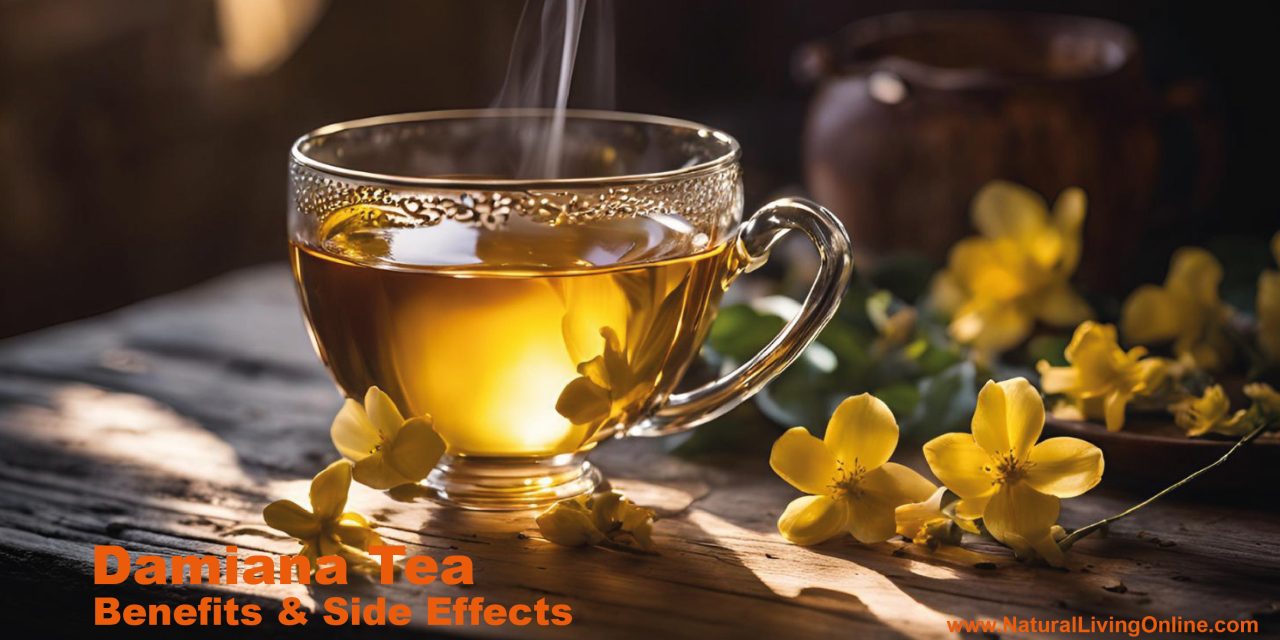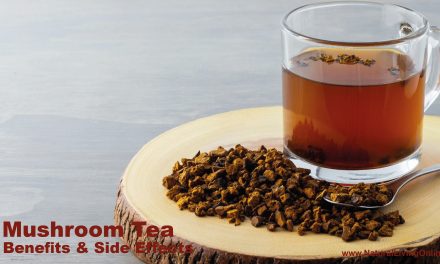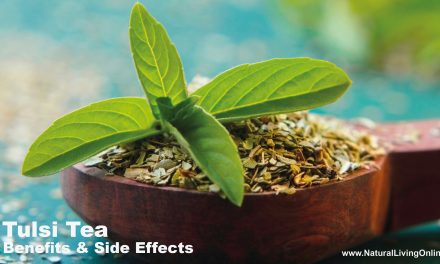Damiana tea comes from the leaves of the Turnera diffusa plant. People have used this herb for centuries as a natural remedy. It grows in Mexico, Central America, and parts of South America.
Damiana tea may boost mood, increase energy, and improve sexual function. Some drink it to feel calmer or sleep better. Others use it to help with digestion or menstrual cramps. The tea has a mild, slightly bitter taste.
Making damiana tea is simple. You can steep the dried leaves in hot water for about 15 minutes. Some add honey or lemon for flavor. As with any herb, it’s best to start with a small amount to see how your body reacts.
Key Takeaways
- Damiana tea comes from a plant used in traditional medicine for various health benefits
- The tea may help with mood, energy, and sexual health
- It’s easy to make at home, but start with small amounts to check for any side effects
Historical Use of Damiana
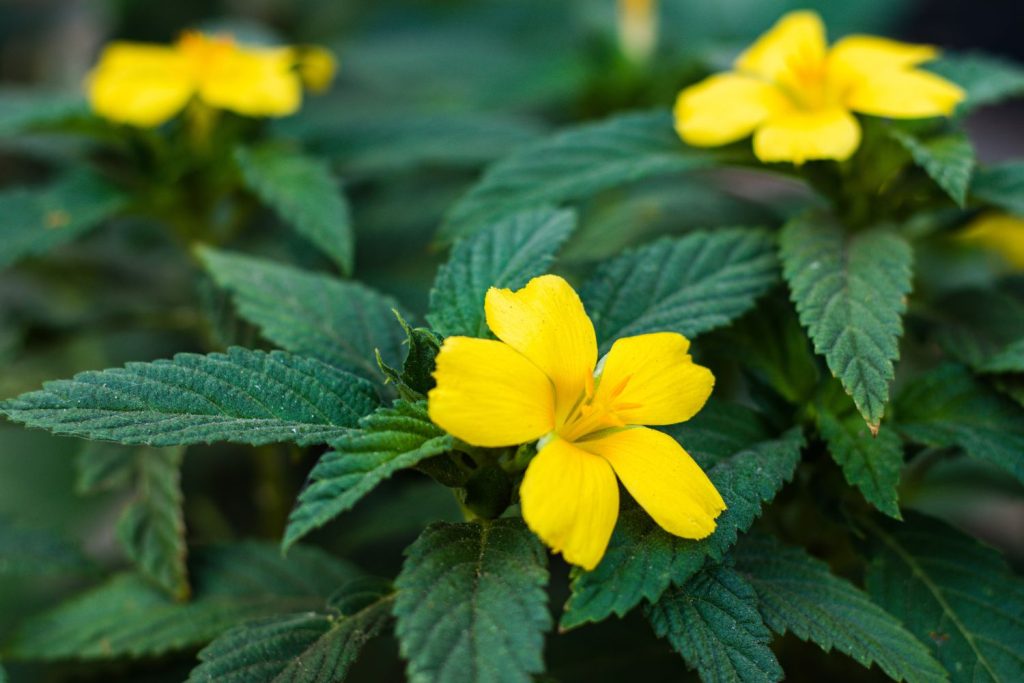
Damiana has deep roots in traditional medicine and cultural practices across Central America. Its use spans centuries, with indigenous peoples valuing it for various purposes.
Origin in Traditional Medicine
Damiana’s history dates back to ancient times. The Mayans and Aztecs used damiana for treating dizziness and as a health tonic. These civilizations recognized its potential early on.
In Mexico, damiana grew wild and became a key herb in local healing practices. Traditional healers used it to boost energy and mood. They also believed it could improve sexual health.
The plant’s leaves were often brewed into a tea. This method allowed people to easily consume its beneficial compounds. Over time, damiana’s use spread throughout Central America.
Cultural Significance
Damiana played an important role in many indigenous cultures. It was more than just medicine – it held spiritual value too.
Some groups used damiana in religious ceremonies. They thought it could bring them closer to the spirit world. The herb was also given to children to calm their fears.
In Mexico, damiana became known as an aphrodisiac. People believed it could spark romance and increase desire. This reputation has lasted for generations.
Today, damiana tea remains popular in its native regions. Many still drink it for its traditional benefits. It serves as a link to ancient wisdom and practices.
Health Benefits and Properties
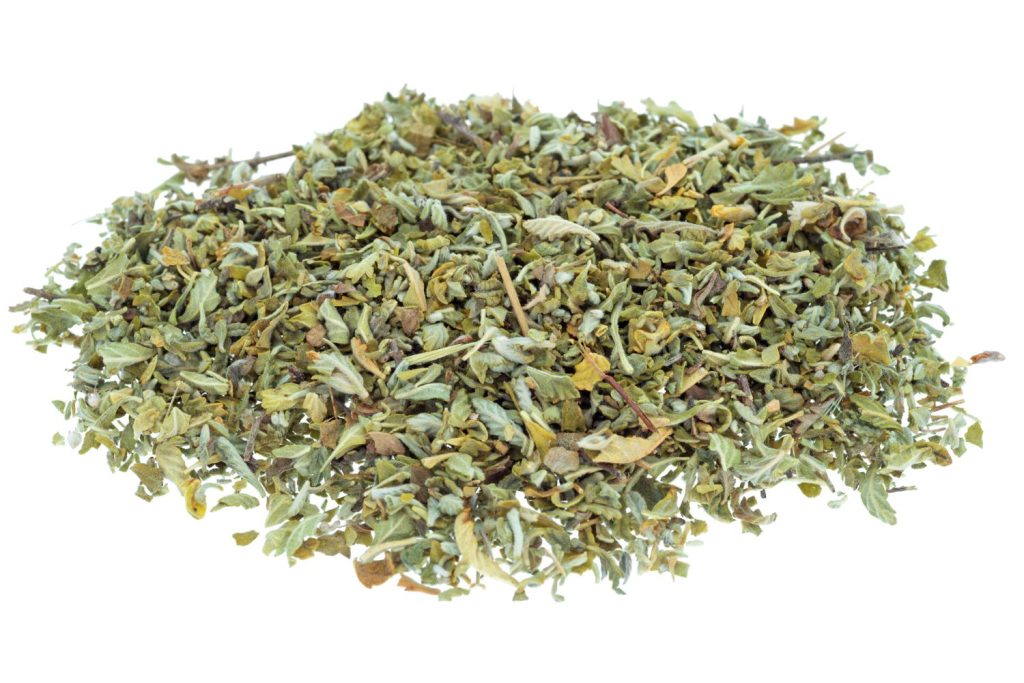
Damiana tea offers several potential health benefits. It may help boost mood, enhance sexual function, aid in weight management, and reduce inflammation in the body.
Boosting Mental Well-Being
Damiana tea has anti-anxiety properties that may help improve mental well-being. It contains compounds that can reduce stress and ease symptoms of depression.
The flavonoids in damiana, such as apigenin, may help calm the nervous system. This can lead to a more relaxed state of mind.
Regular consumption of damiana tea might help improve overall mood and reduce feelings of nervousness. Some people report feeling more positive and energized after drinking it.
Enhancing Sexual Function
Damiana is well-known for its aphrodisiac properties. It may help boost libido in both men and women.
The tea can potentially increase sexual desire and performance. Some studies suggest it may help with erectile dysfunction in men.
For women, damiana tea might help increase sensitivity and arousal. It may also help balance hormones, which can improve overall sexual health.
Weight Management Benefits
Damiana tea may aid in weight loss efforts. It can help suppress appetite and reduce cravings for unhealthy foods.
The tea may boost metabolism, helping the body burn calories more efficiently. This could lead to gradual weight loss over time when combined with a healthy diet and exercise.
Some people find that drinking damiana tea helps reduce emotional eating. This can be beneficial for long-term weight management.
Anti-Inflammatory Effects
Damiana contains anti-inflammatory compounds that may help reduce inflammation in the body. This can be beneficial for overall health and well-being.
The anti-inflammatory properties may help ease muscle aches and joint pain. Some people use damiana tea to help manage symptoms of arthritis and other inflammatory conditions.
Regular consumption of damiana tea might help support a healthy immune system. By reducing chronic inflammation, it may help protect against various diseases.
Preparation and Usage
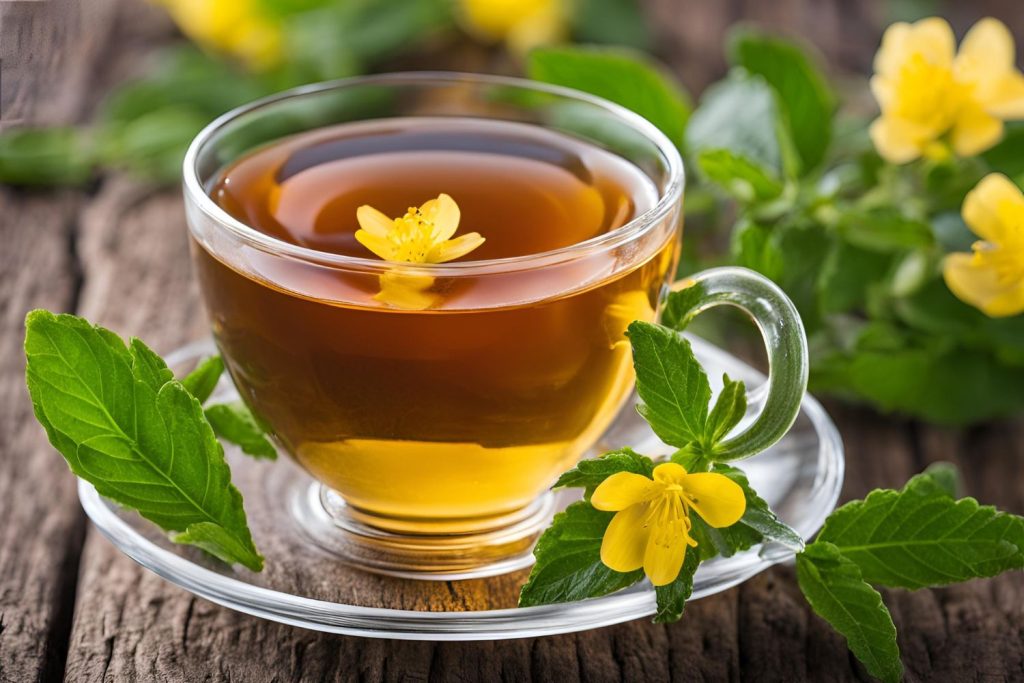
Damiana tea offers a simple way to enjoy this herb’s benefits. Proper preparation and dosing are key for optimal results and safety.
Making Damiana Tea
To make damiana tea, start with dried damiana leaves. Use 1-2 teaspoons of leaves per cup of water. Bring water to a boil, then pour over the leaves. Let steep for 10-15 minutes. Strain and serve.
The tea has a slightly bitter flavor. Adding honey or lemon can improve the taste. Some people mix damiana with other herbs like chamomile or spearmint for extra flavor and benefits.
For convenience, pre-made organic damiana tea bags are available. These offer consistent dosing and easy preparation.
Dosage Guidelines
A typical dose is 1-2 cups of damiana tea per day. Start with one cup and increase slowly if needed. Effects may be felt within 30-60 minutes.
Damiana tinctures offer another option. The usual dose is 2-4 ml, taken 2-3 times daily. Tinctures act faster than tea but may have a stronger taste.
It’s best to take breaks from regular use. Try cycling 5 days on, 2 days off, or using damiana for 3 weeks followed by a 1-week break.
Potential Interactions
Damiana may interact with certain medications and health conditions. It can affect blood sugar levels. People with diabetes should use caution and monitor closely.
Those on blood thinners should avoid damiana. It may increase bleeding risk. Pregnant or breastfeeding women should not use damiana.
Damiana can interact with antidepressants and anxiety medications. It may cause drowsiness when combined with sedatives.
Always consult a healthcare professional before using damiana, especially if you have health issues or take medications. They can advise on safe usage and potential risks.
Potential Side Effects and Precautions
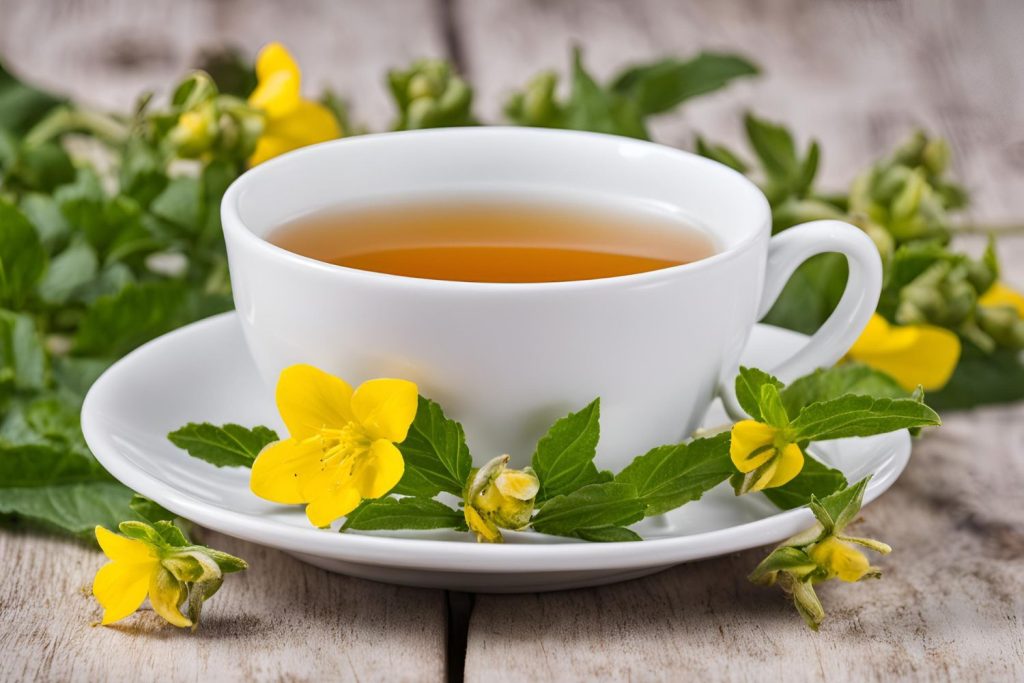
Damiana tea can cause side effects and may not be safe for everyone. It’s important to be aware of possible risks and who should avoid this herbal drink.
Considerations for Special Populations
Pregnant women should avoid damiana tea. It may cause uterine contractions and increase the risk of miscarriage. Breastfeeding mothers should also steer clear, as the effects on infants are unknown.
Children should not drink damiana tea. Its effects on developing bodies have not been studied.
People with liver problems should be cautious. Damiana may affect liver function, though more research is needed.
Those with diabetes should monitor blood sugar levels closely if consuming damiana tea. It may alter blood glucose.
Adverse Reactions and Toxicity
Common side effects of damiana tea include:
- Headaches
- Insomnia
- Nausea
- Anxiety
In rare cases, damiana can cause convulsions when taken in high doses.
People taking medications should consult a doctor before drinking damiana tea. It may interact with certain drugs.
Overuse can lead to dependence in some individuals. Moderation is key.
Some users report mild hallucinations or euphoria at high doses. This can be dangerous and is not recommended.
Comparison with Other Herbal Remedies
Damiana tea offers unique benefits compared to other herbal remedies. Its effects can be enhanced when combined with certain herbs.
Damiana versus Other Aphrodisiacs
Damiana is often compared to other natural aphrodisiacs like Yohimbe and Ginseng. Damiana tea has a milder effect than Yohimbe, which can cause side effects like increased heart rate and blood pressure in some people.
Ginseng is known for boosting energy and libido, similar to damiana. However, damiana has additional calming properties that ginseng lacks.
Guarana, another stimulant herb, provides a stronger energy boost than damiana but doesn’t offer the same relaxation benefits.
Mexican Holly and Old Woman’s Broom are less studied alternatives to damiana. They may have similar effects but lack the long history of traditional use that damiana has.
Synergistic Effects with Other Herbs
Damiana can work well with other herbs to enhance its effects. When combined with ginseng, the mix may provide both energy and relaxation.
Pairing damiana with guarana could balance its calming effects with an energy boost. This combination might be useful for improving both mood and focus.
The bioactive compounds in damiana, such as flavonoids and essential oils, may interact positively with those found in other herbs. For example, combining damiana with chamomile could potentially increase its relaxation effects.
Mixing damiana with peppermint or ginger might improve its digestive benefits. However, it’s important to consult a healthcare professional before combining herbs.
Frequently Asked Questions
What are the potential benefits of drinking damiana tea for women?
Damiana tea may help ease difficult menstruation symptoms in women. It could reduce mood swings and cramps during periods. Some women report feeling more relaxed after drinking damiana tea.
How long does it usually take to experience the effects of damiana?
The effects of damiana tea can vary. Most people report feeling more relaxed within 15-30 minutes of drinking it. For other potential benefits, regular use over several weeks may be needed.
What are the benefits associated with damiana intake for men?
Men may experience improved mood and reduced stress from drinking damiana tea. It has a reputation as an aphrodisiac. Some men report increased energy levels.
Are there any known side effects on the liver from consuming damiana?
There is no strong evidence of damiana causing liver problems. In fact, some research suggests damiana may have liver-protective properties. As with any herb, moderation is key.
Can damiana consumption promote hair growth?
There is limited scientific evidence about damiana’s effects on hair growth. Some people claim it helps, but more research is needed to confirm this potential benefit.
Is it safe to combine damiana with Ashwagandha, and what are the potential effects?
Combining damiana with Ashwagandha is generally considered safe. Both herbs are known for their relaxing properties. Together, they might enhance feelings of calmness and reduce stress.
References:
Assessment of the presence of damiana in herbal blends of forensic interest based on comprehensive two-dimensional gas chromatography
This website does not provide medical advice.
All information provided on this website, and on associated social media networks, including but not limited to texts, images, and numbers are for general information purpose only. It is not intended as medical advice and it does not include all possible precautions, side effects, or interactions that may occur. Neither NaturalLivingOnline.com nor its author/founder take responsibility for how you use this information. Statements contained on NaturalLivingOnline.com have not been evaluated by the FDA. You should conduct thorough research via multiple sources and consult your physician or qualified doctor before using any essential oil or herbal remedy. Information on NaturalLivingOnline.com must not be relied upon for medical, legal, financial or other decisions.

